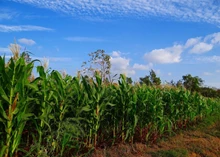
Agriculture has come a long way from its humble beginnings. Over centuries, innovative farming practices have emerged, transforming the industry and enhancing productivity. From ancient techniques to modern technologies, agriculture has undergone a revolution. Likewise, India's agriculture industry has also undergone significant transformation over the years, influenced by various farming practices.
In this article, we delve into some of the top farming practices that have revolutionized agriculture, paving the way for sustainable food production and feeding the ever-growing global population.
Crop Rotation
Crop rotation is a practice dating back to ancient times, where farmers alternate the types of crops grown in a particular field from season to season. This practice helps maintain soil fertility, reduces soil erosion, and controls pests and diseases. By rotating crops, farmers can break pest and disease cycles, utilize nutrients more efficiently, and reduce the need for chemical inputs.
Green Revolution
Initiated in the 1960s, the Green Revolution introduced high-yielding varieties of seeds, modern irrigation techniques, and chemical fertilizers. This led to a substantial increase in crop yields, especially for wheat and rice, addressing food shortages and boosting agricultural productivity.
Crop Diversification
Traditional monoculture farming practices were gradually replaced by crop diversification strategies. Farmers began cultivating a variety of crops such as pulses, oilseeds, fruits, and vegetables alongside staple crops like wheat and rice. This not only improved food security but also enhanced farmers' income and resilience to market fluctuations.
Cooperative Farming
Smallholder farmers are increasingly forming cooperatives or joining Farmer Producer Organizations (FPOs) to collectively access inputs, credit, markets, and technical knowledge. Cooperative farming enables small farmers to achieve economies of scale, negotiate better prices, and enhance their bargaining power in the market, thereby improving their livelihoods and resilience.
Agroforestry
Agroforestry combines trees or shrubs with crops or livestock in a symbiotic system. Integrating trees with agricultural crops through agroforestry practices offers multiple benefits such as soil conservation, carbon sequestration, biodiversity conservation, and additional income streams from timber, fruits, and medicinal plants. Agroforestry systems contribute to sustainable land use, climate resilience, and socio-economic development in rural areas.
Precision Agriculture
Precision agriculture involves using technology such as GPS, sensors, drones, and data analytics to optimize crop production and resource management. By collecting and analyzing data on soil conditions, weather patterns, crop health, and yield potential, farmers can make more informed decisions regarding planting, irrigation, fertilization, and pest management. Precision agriculture allows farmers to minimize inputs, maximize yields, and reduce environmental impact.
Genetic Engineering and Biotechnology
Advancements in genetic engineering and biotechnology have revolutionized crop breeding and development. Genetically modified (GM) crops are engineered to possess traits such as pest resistance, herbicide tolerance, and drought tolerance. These traits help increase crop yields, reduce pesticide use, and improve resilience to environmental stresses. Biotechnology also enables the development of crops with enhanced nutritional content and shelf life, contributing to global food security.
The adoption of innovative farming practices has transformed agriculture, making it more sustainable, productive, and resilient. By continuing to innovate and integrate sustainable practices, agriculture will continue to evolve, ensuring food security for generations to come.










